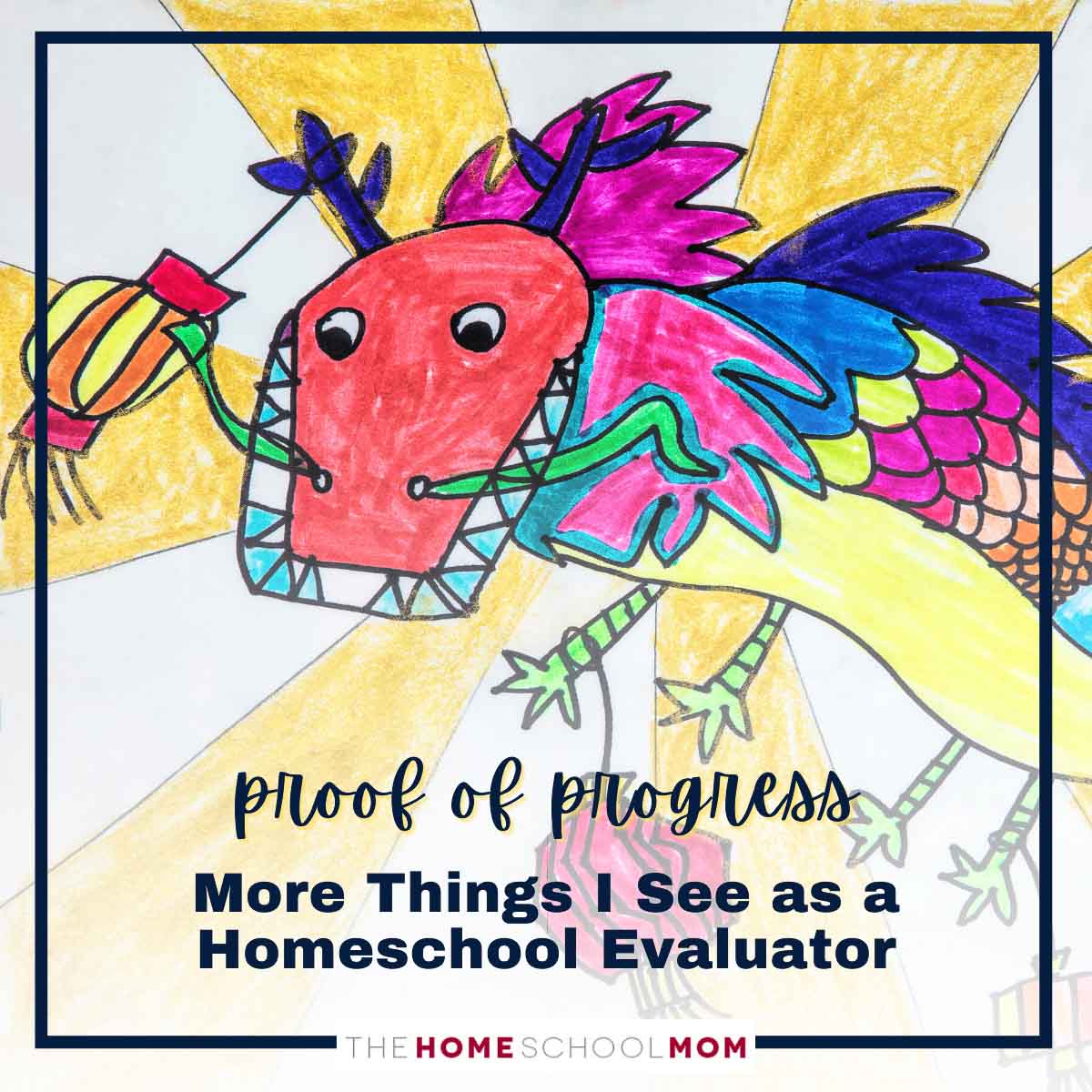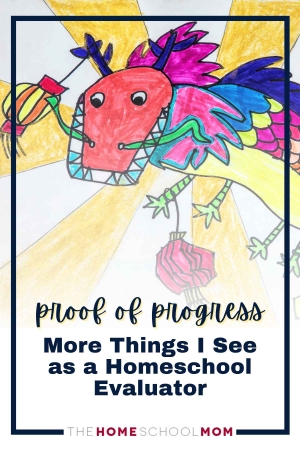Proof of Progress: More Examples from Homeschool Evaluations
This post was originally published as the introduction to an issue of TheHomeSchoolMom newsletter. Sign up here and get access to subscriber exclusive resources.
You might like to hear about what I’ve been seeing while in the thick of homeschool evaluation season in Virginia. I meet with families, and they tell me what they’ve been learning about and show me evidence of progress. I write a letter documenting that progress as one way of satisfying our state’s annual homeschool requirements.

I've previously shared some of the things I have seen when I review homeschool learning. Here are more ways homeschoolers have shared their learning with me:
- A child’s beautifully illustrated and handwritten original Encyclopedia of Dragons
- A middle schooler’s nature collection, with fossils, bones, and feathers collected, identified, curated, and displayed in his home
- Family field trip photos of visits to museums, historical sites, science centers, nature preserves, trails, manufacturing facilities, and farms - accompanied by children’s explanations of what they learned there
- Miles of written workbook pages and tests in math, language arts, foreign language, history, and science
- Reproductions of Roman architecture in Minecraft
- Lovely Waldorf-inspired form drawings and main lesson books
- Charlotte Mason-inspired nature journals
- Video of Destination Imagination competitions
- Sketchbooks of child-created original anime and Pokemon characters, complete with creation of back-stories for the new characters
- A collection of plays written by a young middle schooler
- A narrative film composed, acted, and produced by a group of homeschooled siblings - complete with hand-wrought props and subtitles
- Kid-designed book dust jacket projects in lieu of traditional book reports
- Traditional book reports!
- Research papers, essays, reading lists, book reviews, fan fiction, and creative writing
- Demonstrations of kid-created computer code in Scratch, Python, and other programs
- Video of dance recitals, Scouts award presentations, martial arts testing, ice skating, and riding lessons
- New readers and new writers showing off their new skill (ranging from age 6 to age 9)
- Photos, videos, and lab reports of science experiments and labs
- Photos and video of a middle schooler with his home-designed and home-built forge, along with the metal work he has done himself
- Lots of dichotomous keys!
- Classwork from homeschool co-ops and classes
- Transcripts being put together for high school students
- Playbills for theatre productions attended and acted in
- Video of musical and dramatic performances
- Visual representations of adding and subtracting negative numbers - with M&Ms as manipulatives
- Rubik’s cube demonstrations
- Solar system models and Little House dioramas
- Amazing art: ceramic mosaics, handwork, watercolors, art done in the style of the masters, sketches, sculptures
- Farm life journals chronicling 4H projects, gardening, egg incubation, milk production, and horse training
- Many backyard chicken flocks
- Brave Writer-inspired copy work, jot-it-down projects, and Poetry Teatimes
- Math games and demonstrations
- Electric and solar operated model cars
- Unschoolers’ business plans, novels and short stories, bird lists, treehouses, and Raspberry Pi projects
- So many LEGO™ bricks
All that, plus an adorable kitten a family rescued on the way to our evaluation meeting! Last year, the same family brought a rescued baby chick they found on the side of the road on the way to our meeting. I’m a bit nervous about what they might bring next year.
Get Our Planner & More
Sign up below for access to our homeschool planner and more.
I’m not convinced providing annual evidence of progress makes a difference in homeschooling processes or outcomes, because I’ve homeschooled in so many places, including in states where this is not required. That said, it’s my privilege to see what goes on in the homes and the lives of homeschoolers each year, and to help families and school divisions understand and value diverse approaches to education and authentic learning.
The learning can be humble, exciting, traditional, or way outside the box. It may include memorization, creativity, data gathering, experimentation, reading, writing, critical thinking, original research, technology, entrepreneurship, or games.
The incidental learning may outweigh the parents’ planned agenda, or the parent’s planned agenda may stimulate most of what I see. In both cases, I see parents partnering with their children to help them learn and thrive.

Jeanne Faulconer, M.A.

A popular speaker at homeschooling conferences, business groups, and parents’ groups, Jeanne Potts Faulconer homeschooled her three sons in North Carolina, Mississippi, and Virginia for twenty years. Holding her Master of Arts degree in Communication, Jeanne conducted portfolio evaluations for Virginia homeschoolers for evidence of progress for many years. Jeanne is a former college faculty member, former editor for several publications, news correspondent for WCVE, and former director of Brave Learner Home. She is the contributing editor for TheHomeSchoolMom newsletter and writes the popular Ask Jeanne column addressing homeschool parents' questions here at TheHomeSchoolMom.
Reader Interactions
Leave a Reply Cancel reply
This site uses Akismet to reduce spam. Learn how your comment data is processed .




